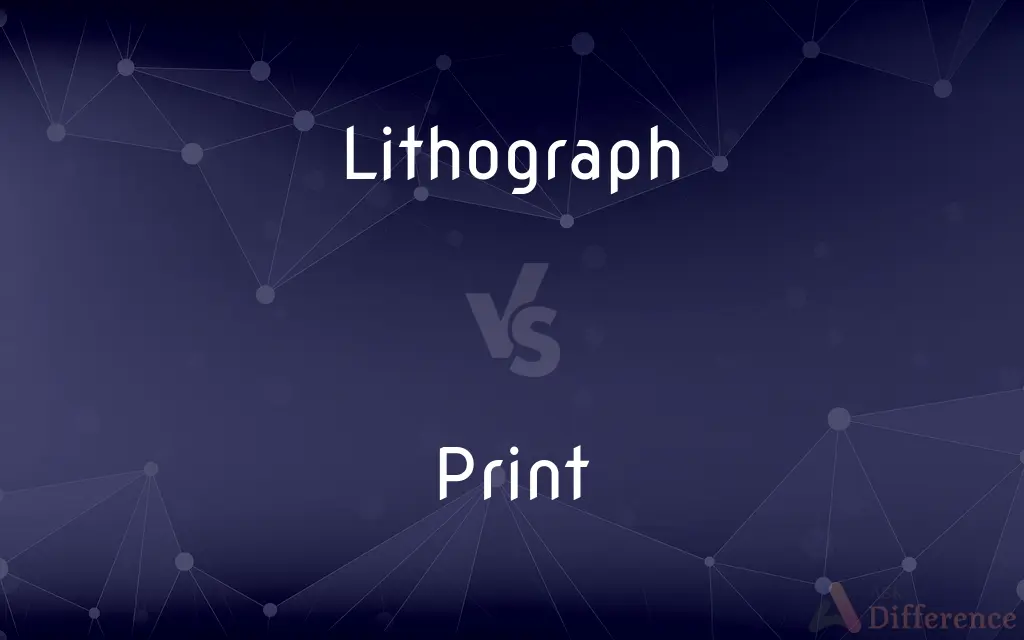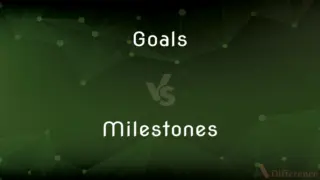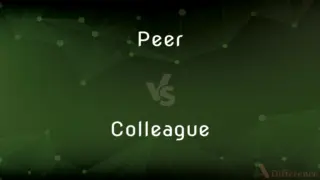Lithograph vs. Print — What's the Difference?
By Tayyaba Rehman — Published on October 9, 2023
Lithograph is a specific printmaking technique using limestone or metal plates, while print is a generic term for an image produced from a template.

Difference Between Lithograph and Print
Table of Contents
ADVERTISEMENT
Key Differences
The terms lithograph and print often appear in the context of art and printmaking, yet they hold different meanings. A lithograph specifically references a printmaking process where an image is drawn onto limestone or a metal plate with a greasy medium. In contrast, print is a broader term, referring to any image or text reproduced from a template or matrix.
When discussing the world of art, a lithograph is generally considered a type of original artwork, as the artist typically draws directly onto the plate. Print, however, can encompass various techniques, from digital printing to traditional methods like etching and woodcut. Therefore, while all lithographs are prints, not all prints are lithographs.
From a collector's standpoint, lithographs can often hold more value than other types of prints. This is because lithographs usually have limited editions and are directly tied to an artist's hand. Print, being a more encompassing term, can refer to mass-produced items or limited edition pieces, making its value variable based on its rarity and the technique used.
In daily vernacular, print can also refer to digital or photographic reproductions, printed documents, and even patterns on fabrics. Lithograph, however, remains tied to its specific printmaking technique, seldom straying from its art-related connotations.
Comparison Chart
Definition
A printmaking technique using limestone or metal plates.
An image/text produced from a template/matrix.
ADVERTISEMENT
Art Context
Considered an original art piece.
Can be original or a reproduction.
Technique Specificity
Specific to its method.
Encompasses various techniques.
Value
Often holds higher value in art collection.
Value varies based on rarity and technique.
Usage
Primarily art-related.
Broad usage including documents, photos, and patterns.
Compare with Definitions
Lithograph
An artwork produced by the lithography technique.
The gallery displayed a rare 19th-century lithograph.
An image or text produced from a template.
The print of the photograph was crystal clear.
Lithograph
A method where images are drawn with a greasy medium.
The lithograph process allows for smooth gradients.
A pattern on fabric or clothing.
The dress had a floral print.
Lithograph
A technique resisting water-based ink except where drawn.
The artist used lithograph methods to ensure precise ink application.
A digital command to produce hard copies.
After editing the document, he hit 'print' on his computer.
Lithograph
A print created in limited editions using lithography.
Collectors value lithographs for their authenticity.
Produce (books, newspapers, etc.), especially in large quantities, by a mechanical process involving the transfer of text or designs to paper
A thousand copies of the book were printed
Lithograph
A printmaking process using limestone or metal plates.
The artist's lithograph showcased intricate details.
Write (text) clearly without joining the letters together
Print your name and address on the back of the cheque
Lithograph
A print produced by lithography.
Mark (a surface, typically a fabric or garment) with a coloured design or pattern
A delicate fabric printed with roses
Lithograph
To produce by lithography.
The text appearing in a book, newspaper, or other printed publication, especially with reference to its size, form, or style
Bold print
She forced herself to concentrate on the tiny print
Lithograph
A printed image produced by lithography.
An indentation or mark made on a surface or soft substance
There were paw prints everywhere
Lithograph
To create a copy of an image through lithography.
A picture or design printed from a block or plate or copied from a painting by photography
The walls were hung with sporting prints
Lithograph
To trace on stone by the process of lithography so as to transfer the design to paper by printing; as, to lithograph a design; to lithograph a painting. See lithography.
A piece of fabric or clothing with a coloured pattern or design printed on it
Light summer prints
A floral print dress
Lithograph
A print made by lithography.
A mark or impression made in or on a surface by pressure
The print of footsteps in the sand.
Lithograph
A print produced by lithography
A fingerprint.
Lithograph
Duplicator that prints by lithography; a flat surface (of stone or metal) is treated to absorb or repel ink in the desired pattern
A device or implement, such as a stamp, die, or seal, used to press markings onto or into a surface
Fancy letters made by hand-carved prints.
Lithograph
Make by lithography
Something formed or marked by such a device.
Text, lettering, or other marks produced in ink from type as by a printing press or from digital fonts by an electronic printer
Needed glasses to read the print.
Printed state or form
A short story that never got into print.
A printed publication or edition of a text; a printing
The first print of that book has sold out.
A design or picture transferred from an engraved plate, wood block, lithographic stone, or other medium
Had prints of flowers hanging on the walls.
A photographic image transferred to paper or a similar surface.
A copy of a movie made on film or in a high resolution digital format, as for public exhibition.
A fabric or garment with a dyed pattern that has been pressed onto it, usually by engraved rollers.
The pattern itself
A blouse with a paisley print.
To press (a mark or design, for example) onto or into a surface
Tracks that were printed in the snow.
To make an impression on or in (a surface) with a device such as a stamp, seal, or die.
To press (something, such as a stamp) onto or into a surface to leave a marking.
To produce by means of pressed type, an electronic printer, or similar means, on a paper surface
Printed more copies of the ad.
To offer in printed form; publish
The publisher collected the essays and printed them as a book.
To reproduce (a digital document or image) on a paper surface
Printed the email.
To convert (a digital document) into a file format designed for publication.
To write (something) in characters similar to those commonly used in print.
To impress firmly in the mind or memory
An experience that will be printed in our hearts forever.
To produce a photographic image from (a negative, for example) by passing light through film onto a photosensitive surface, especially sensitized paper.
To produce (an electronic component) by mechanically transferring a circuit or circuit pattern onto a nonconductive surface.
To fabricate (an object) by means of a 3D printer.
To work as a printer.
To produce something in printed form by means of a printing press or other reproduction process.
To write characters similar to those commonly used in print.
To produce or receive an impression, marking, or image
The negative printed poorly.
Published or reproduced by printing, especially in contrast to electronic publication
A print newsletter.
Relating to or involved in media based on printing, especially newspapers and magazines
A print journalist.
Of, relating to, or writing for printed publications.
A print edition of a book
(transitive) To produce one or more copies of a text or image on a surface, especially by machine; often used with out or off: print out, print off.
Print the draft double-spaced so we can mark changes between the lines.
To produce a microchip (an integrated circuit) in a process resembling the printing of an image.
The circuitry is printed onto the semiconductor surface.
(ambitransitive) To write very clearly, especially, to write without connecting the letters as in cursive.
Print your name here and sign below.
I'm only in grade 2, so I only know how to print.
(ambitransitive) To publish in a book, newspaper, etc.
How could they print an unfounded rumour like that?
(transitive) To stamp or impress (something) with coloured figures or patterns.
To print calico
(transitive) To fix or impress, as a stamp, mark, character, idea, etc., into or upon something.
(transitive) To stamp something in or upon; to make an impression or mark upon by pressure, or as by pressure.
To display a string on the terminal.
To produce an observable value.
On March 16, 2020, the S&P printed at 2,386.13, one of the worst drops in history.
(transitive) To fingerprint (a person).
(uncountable) Books and other material created by printing presses, considered collectively or as a medium.
Three citations are required for each meaning, including one in print.
TV and the Internet haven't killed print.
(uncountable) Clear handwriting, especially, writing without connected letters as in cursive.
Write in print using block letters.
(uncountable) The letters forming the text of a document.
The print is too small for me to read.
(countable) A newspaper.
A visible impression on a surface.
Using a crayon, the girl made a print of the leaf under the page.
A fingerprint.
Did the police find any prints at the scene?
A footprint.
(visual art) A picture that was created in multiple copies by printing.
(photography) A photograph that has been printed onto paper from the negative.
(film) A copy of a film that can be projected.
Cloth that has had a pattern of dye printed onto it.
(architecture) A plaster cast in bas relief.
To fix or impress, as a stamp, mark, character, idea, etc., into or upon something.
A look will print a thought that never may remove.
Upon his breastplate he beholds a dint,Which in that field young Edward's sword did print.
Perhaps some footsteps printed in the clay.
To stamp something in or upon; to make an impression or mark upon by pressure, or as by pressure.
Forth on his fiery steed betimes he rode,That scarcely prints the turf on which he trod.
To strike off an impression or impressions of, from type, or from stereotype, electrotype, or engraved plates, or the like; in a wider sense, to do the typesetting, presswork, etc., of (a book or other publication); as, to print books, newspapers, pictures; to print an edition of a book.
To stamp or impress with colored figures or patterns; as, to print calico.
To take (a copy, a positive picture, etc.), from a negative, a transparent drawing, or the like, by the action of light upon a sensitized surface.
To use or practice the art of typography; to take impressions of letters, figures, or electrotypes, engraved plates, or the like.
To publish a book or an article.
From the moment he prints, he must except to hear no more truth.
A mark made by impression; a line, character, figure, or indentation, made by the pressure of one thing on another; as, the print of teeth or nails in flesh; the print of the foot in sand or snow.
Where print of human feet was never seen.
A stamp or die for molding or impressing an ornamental design upon an object; as, a butter print.
That which receives an impression, as from a stamp or mold; as, a print of butter.
Printed letters; the impression taken from type, as to excellence, form, size, etc.; as, small print; large print; this line is in print.
That which is produced by printing.
A core print. See under Core.
The result of the printing process;
I want to see it in black and white
A picture or design printed from an engraving
A visible indication made on a surface;
Some previous reader had covered the pages with dozens of marks
Paw prints were everywhere
A copy of a movie on film (especially a particular version of it)
A fabric with a dyed pattern pressed onto it (usually by engraved rollers)
A printed picture produced from a photographic negative
Put into print;
The newspaper published the news of the royal couple's divorce
These news should not be printed
Write as if with print; not cursive
Make into a print;
Print the negative
Reproduce by printing
A mark made by pressing something on a surface.
The muddy footprint was a clear print of someone's shoe.
To produce multiple copies using a machine.
She decided to print 100 invitations for the event.
Common Curiosities
What is a lithograph?
A lithograph is a specific printmaking technique using limestone or metal plates.
Are there other printmaking techniques aside from lithography?
Yes, there are many, including etching, woodcut, and screen printing.
Is every lithograph considered original artwork?
Typically, lithographs are considered original as the artist often draws directly onto the plate.
What materials can be used for the lithograph process?
Traditionally, limestone is used, but metal plates are also common in modern lithography.
How does a print differ from a lithograph?
Print is a general term for an image or text reproduced from a template, while lithograph specifies a particular printmaking process.
Why might a lithograph be more valuable than other prints?
Lithographs are often limited editions and directly linked to an artist's hand, adding to their value.
Which might be more expensive: a lithograph or a digitally printed reproduction?
Typically, a lithograph will hold more value, especially if it's an original and limited edition.
Do all prints hold the same value?
No, the value of a print can vary based on its technique, rarity, and whether it's an original or reproduction.
Can the term "print" refer to patterns on fabric?
Yes, "print" can denote patterns or designs on materials, like a leopard print.
How do artists decide on the edition size for lithographs?
The edition size is at the artist's discretion and can be influenced by demand, exclusivity, and other factors.
How is the image transferred in lithography?
In lithography, an image is drawn onto a plate with a greasy medium, which then repels water-based ink except where the image is drawn.
Is the term "print" limited to art?
No, "print" has a broad usage, including printed documents, photos, and patterns on fabrics.
Is lithography a modern or ancient technique?
Lithography was invented in the late 18th century, making it relatively modern compared to ancient printmaking methods.
Can "print" refer to a digitally printed photograph?
Yes, a digitally reproduced photograph is commonly called a print.
Is digital printing considered a form of printmaking in art?
While digital printing produces prints, it's distinct from traditional printmaking techniques, which often involve more manual processes.
Share Your Discovery

Previous Comparison
Usability vs. User Experience
Next Comparison
Goals vs. MilestonesAuthor Spotlight
Written by
Tayyaba RehmanTayyaba Rehman is a distinguished writer, currently serving as a primary contributor to askdifference.com. As a researcher in semantics and etymology, Tayyaba's passion for the complexity of languages and their distinctions has found a perfect home on the platform. Tayyaba delves into the intricacies of language, distinguishing between commonly confused words and phrases, thereby providing clarity for readers worldwide.
















































